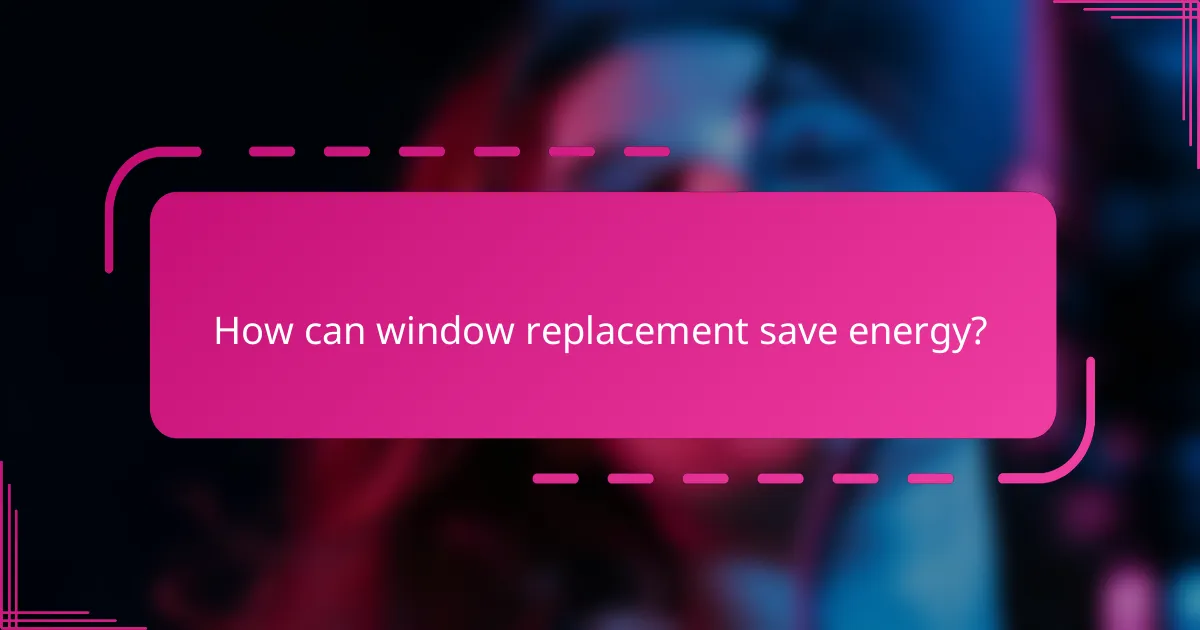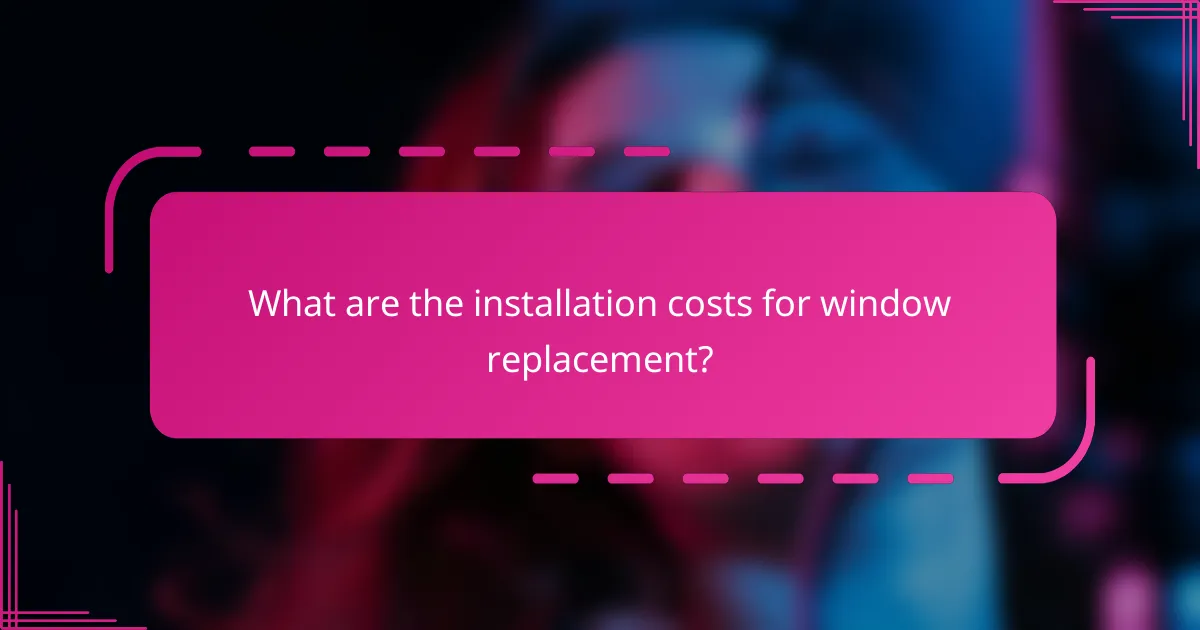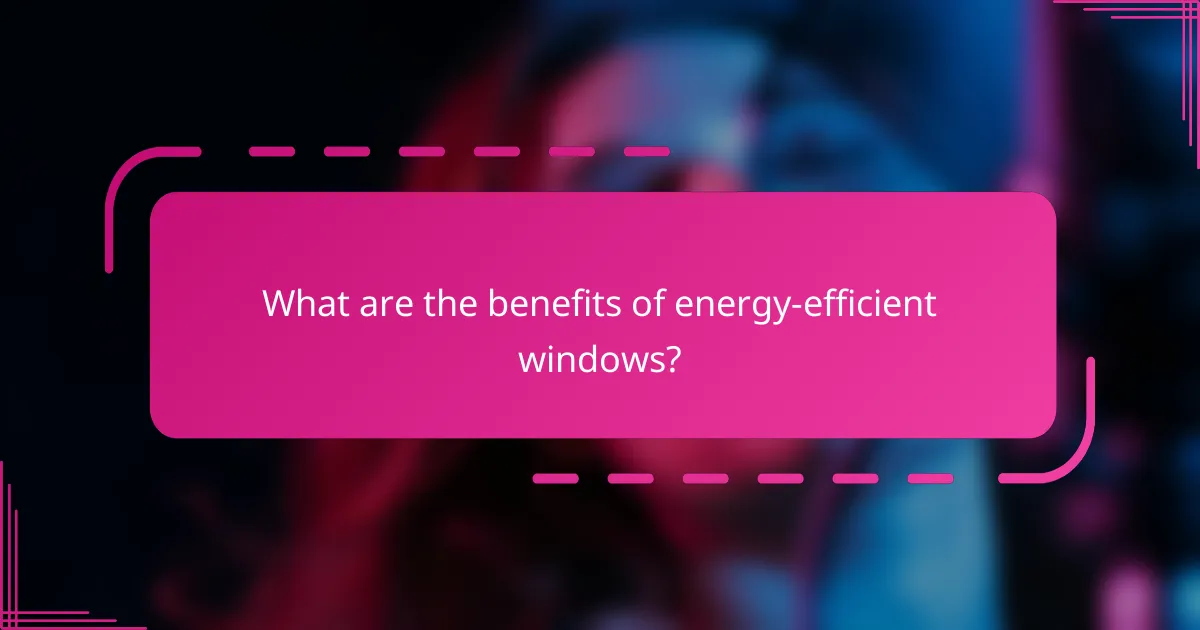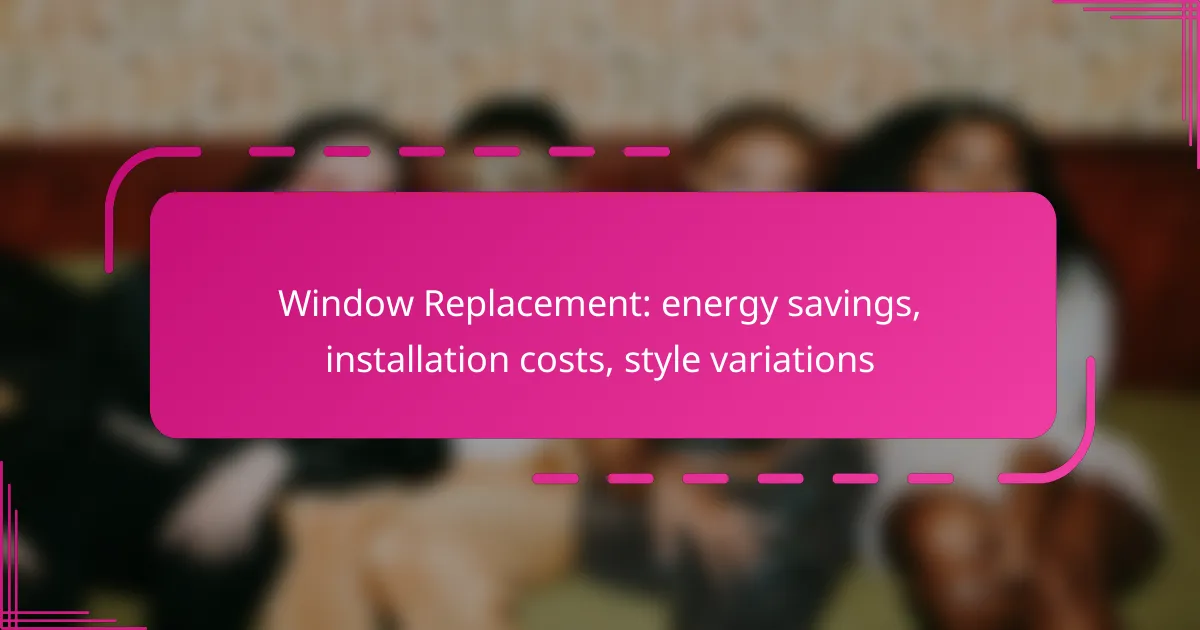Window replacement is an effective way to boost energy efficiency, enhance comfort, and reduce heating and cooling costs through improved insulation and advanced glass options. While installation costs can range widely based on factors like window type and size, homeowners should anticipate spending several hundred to several thousand dollars per window. Additionally, a variety of styles, such as casement, double-hung, and sliding windows, provide options to suit both aesthetic preferences and functional requirements.

How can window replacement save energy?
Window replacement can significantly enhance energy efficiency by improving insulation, using advanced glass options, and reducing heating and cooling costs. These upgrades not only lower energy bills but also contribute to a more comfortable living environment.
Improved insulation
Replacing old windows with modern, insulated models can drastically reduce heat transfer. New windows often feature multiple panes of glass and gas fills, such as argon or krypton, which enhance thermal performance. This improved insulation helps maintain indoor temperatures, reducing the reliance on heating and cooling systems.
When selecting windows, look for those with a high R-value, which indicates better insulation. In colder climates, double or triple-pane windows are often recommended to maximize energy savings.
Energy-efficient glass options
Energy-efficient glass options, such as low-emissivity (Low-E) coatings, can further enhance the energy performance of windows. These coatings reflect heat back into the home during winter and block excess heat during summer, contributing to year-round comfort. Additionally, tinted or reflective glass can reduce glare and heat gain in sunny areas.
Consider the climate in your region when choosing glass types. For example, Low-E glass is particularly beneficial in areas with extreme temperature fluctuations, as it helps maintain consistent indoor conditions.
Reduction in heating and cooling costs
By improving insulation and utilizing energy-efficient glass, window replacement can lead to significant reductions in heating and cooling costs. Homeowners may see savings of 10-25% on their energy bills, depending on the efficiency of the new windows compared to the old ones.
To maximize savings, consider conducting an energy audit before replacement. This can help identify the most effective upgrades and ensure that the investment in new windows pays off over time.

What are the installation costs for window replacement?
Installation costs for window replacement can vary significantly based on several factors, including window type, size, and labor rates. Typically, homeowners can expect to spend anywhere from a few hundred to several thousand dollars per window, depending on these variables.
Average cost per window
The average cost for window replacement generally ranges from $300 to $1,000 per window, including both materials and installation. This price can fluctuate based on the window’s size, style, and energy efficiency features. For instance, standard double-hung windows may fall on the lower end of this spectrum, while custom or specialty windows could push costs higher.
Factors affecting installation costs
Material choice also plays a critical role; vinyl windows are often more affordable than wood or fiberglass options. Energy-efficient windows may have a higher upfront cost but can lead to long-term savings on energy bills.
Cost comparison by window type
Specialty windows, such as bay or bow windows, can be significantly more expensive, often exceeding $1,500 due to their size and complexity. Homeowners should weigh the initial costs against potential energy savings and aesthetic benefits when choosing window types.

What style variations are available for window replacement?
When considering window replacement, various styles cater to different aesthetic preferences and functional needs. The most common styles include casement, double-hung, and sliding windows, each offering unique features and benefits.
Casement windows
Casement windows are hinged on one side and open outward, providing excellent ventilation and unobstructed views. They are often favored for their energy efficiency, as the tight seal when closed minimizes air leakage.
These windows are ideal for hard-to-reach areas, as they can be easily operated with a crank. However, they may require more maintenance due to their mechanical parts and can be less suitable for areas with heavy wind exposure.
Double-hung windows
Double-hung windows feature two operable sashes that slide vertically, allowing for versatile ventilation options. They are popular for traditional and modern homes alike, providing a classic look while being easy to clean.
These windows can be more energy-efficient than single-hung designs, especially with modern materials and insulation. However, ensure proper installation to avoid issues with air leaks and drafts, which can increase heating and cooling costs.
Sliding windows
Sliding windows consist of two or more sashes that slide horizontally, making them easy to operate and ideal for spaces where outward opening is not feasible. They are often used in contemporary designs and can enhance natural light in a room.
While sliding windows are generally low-maintenance, they may not provide the same level of energy efficiency as casement or double-hung windows if not properly sealed. Consider the climate in your area when selecting sliding windows, as they may require additional insulation in colder regions.

What are the benefits of energy-efficient windows?
Energy-efficient windows provide significant advantages, including reduced energy consumption, lower utility costs, and improved comfort in your home. By minimizing heat transfer, these windows help maintain a stable indoor temperature, leading to overall savings and enhanced living conditions.
Lower utility bills
One of the primary benefits of energy-efficient windows is their ability to lower utility bills. By reducing the amount of heat lost during winter and heat gained during summer, these windows can decrease heating and cooling costs by a notable percentage. Homeowners can expect savings ranging from 10% to 25% on their energy bills, depending on the climate and existing window conditions.
When considering window replacement, look for ENERGY STAR® certified products, which meet strict energy efficiency guidelines. Investing in double or triple-pane glass with low-emissivity (Low-E) coatings can further enhance energy savings.
Increased home value
Installing energy-efficient windows can significantly increase your home’s market value. Potential buyers often prioritize energy efficiency, making homes with upgraded windows more attractive. In many cases, homeowners can recoup a substantial portion of their investment—sometimes up to 70%—when selling their property.
Additionally, energy-efficient windows can enhance curb appeal, further boosting your home’s desirability. Consider styles that complement your home’s architecture while providing energy savings, as this combination can yield the best return on investment.
Enhanced comfort
Energy-efficient windows contribute to a more comfortable living environment by regulating indoor temperatures and reducing drafts. They help maintain a consistent temperature throughout your home, minimizing hot or cold spots that can occur with traditional windows.
Moreover, these windows can also reduce noise pollution from outside, creating a quieter indoor atmosphere. Homeowners often notice a significant difference in comfort levels, especially in urban areas or near busy roads, making energy-efficient windows a worthwhile investment for both comfort and efficiency.

What factors should be considered when choosing windows?
Choosing windows involves evaluating energy efficiency, installation costs, and style variations. These factors significantly impact your home’s comfort, utility bills, and aesthetic appeal.
Climate considerations
Climate plays a crucial role in window selection. For instance, homes in colder regions benefit from double or triple-pane windows with low-emissivity (low-E) coatings to minimize heat loss. Conversely, in warmer climates, windows that reflect heat can help reduce cooling costs.
Consider the orientation of your home as well. South-facing windows can maximize sunlight in winter, while overhangs can provide shade in summer, enhancing energy efficiency.
Material options
Window materials vary widely, each offering distinct advantages. Vinyl windows are popular for their affordability and low maintenance, while wood windows provide superior insulation and aesthetic appeal but require more upkeep.
Aluminum frames are durable and lightweight but may not offer the best insulation. Fiberglass windows are an excellent choice for energy efficiency and durability, though they tend to be more expensive.
Local building codes
Local building codes dictate specific requirements for window installations, including energy performance standards and safety regulations. Familiarize yourself with these codes to ensure compliance and avoid costly modifications later.
For example, some regions may require impact-resistant windows in hurricane-prone areas, while others may have guidelines on the use of certain materials. Always check with local authorities or a qualified contractor before proceeding with your window replacement project.

How do window replacement warranties work?
Window replacement warranties provide coverage for defects in materials and workmanship, ensuring that homeowners are protected against potential issues after installation. These warranties can vary significantly in terms of duration and what they cover, so understanding the specifics is crucial for making an informed decision.
Types of warranties
There are generally two main types of warranties for window replacements: manufacturer warranties and labor warranties. Manufacturer warranties cover defects in the window materials, while labor warranties focus on the installation work. Some companies offer combined warranties that cover both aspects.
Duration of coverage
The duration of window replacement warranties can range from a few years to several decades, depending on the manufacturer and the specific product. It’s common to see warranties lasting between 10 to 20 years for materials, while labor warranties may be shorter, often around 1 to 5 years.
What is covered
Coverage typically includes defects such as seal failure, frame warping, and issues with hardware. However, it often excludes damage caused by improper installation, neglect, or extreme weather conditions. Always read the warranty details carefully to understand what is and isn’t included.
How to file a claim
To file a warranty claim, homeowners usually need to provide proof of purchase and documentation of the issue. It’s advisable to contact the manufacturer or installer directly, as they can guide you through the process. Keep in mind that claims may require inspection and could take time to resolve.
Common pitfalls
One common pitfall is assuming all warranties are the same; they can vary widely in terms of coverage and duration. Another mistake is neglecting to register the warranty, which may be necessary for it to remain valid. Always ensure you understand the warranty terms before proceeding with your window replacement project.
